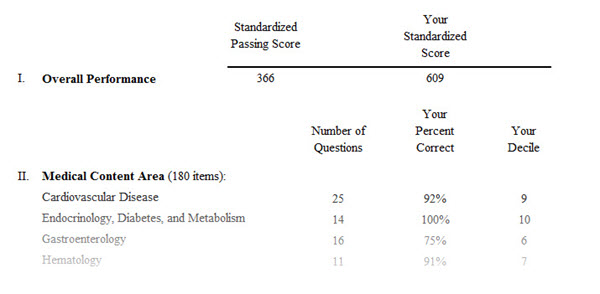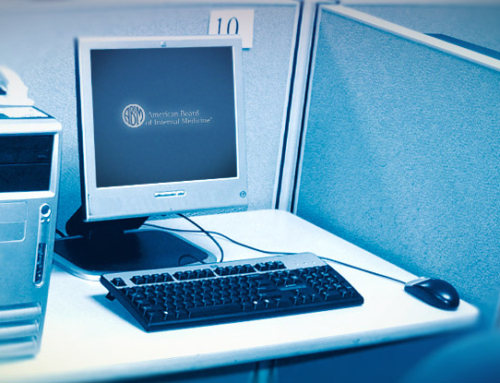If you are taking or have recently taken an ABIM Maintenance of Certification exam, you are probably spending a great deal of time thinking about ABIM results. Did you do enough to prepare? Did you study the right topics? How will your exam be scored? Is the process fair? What are your chances of failing? And what happens if you fail?
First, you have somewhere in the vicinity of 3 months to take some much-needed relaxation time as you await your personal ABIM results. One reason for the waiting period is that ABIM analyzes and evaluates each exam to ensure that the results are reliable. This means that a flaw in the exam itself — a poorly worded question, for example, or a question that has been supplanted by new evidence or accepted clinical practice — will not be allowed to affect your final results.
When ABIM results are released, you will receive an email notification, and you can log into the ABIM website to retrieve your pass/fail status. A detailed score report will arrive by mail with more information, including your overall performance, your scores by several medical content areas, aggregate participation and performance data for the exam, and a description of how scores are determined.
Inside the ABIM Results
The exam scoring process is more complex than you might think. Of note is that whether you pass or fail relies solely on achieving a standardized passing score, which is established by the Internal Medicine Test Committee and approved by ABIM. A physician shared his 2012 ABIM score report, which elaborates as follows:
Overall examination performance is reported on a standardized score scale with a range of 200 to 800. The mean standardized score for first-time takers on the base test form of this examination is 500 and the standard deviation is 100. For example, a score of 600 is one standard deviation above the mean. Candidates with equal ability will achieve the same standardized score.
In other words, the pass-fail decision is based on your mastery of content rather than your rank relative to other exam takers. To determine the standard passing score, which may vary slightly from exam to exam, the testing committee undertakes a three-step process. Again, as described in an actual 2012 ABIM results score report:
First, standard-setting groups discussed the characteristics of minimally qualified or borderline candidates. Next, items on the test were reviewed and group members identified the expected performance of borderline candidates for each item. Finally, these judgments were systematically combined to derive a passing score for all examinees on the standardized score scale.
While exams are offered on multiple dates and different forms of the exam are administered, they are designed to be equivalent in content and difficulty, so that exam takers face the same challenge regardless of the date on which they take the exam.
About Your ABIM Results
While the exam is strictly pass/fail, your score report will include details — your percentages of correct answers — for each major medical content area tested. If the exam had a sufficient number of exam takers, your report will also show, in terms of decile, how your performance compared to others taking the same exam according to each major medical content area.

For some, passing may not be the only thing that matters. In the interests of lifelong medical learning, the information in your ABIM results may be useful for informing and directing your ongoing consumption of medical literature, continuing medical education (CME), and Maintenance of Certification activities going forward. The score report can also form a personal blueprint for re-examination preparation should you fail to pass on your first attempt.
At the same time, however, ABIM advises caution if you are attempting to generalize from performance on a particular content area to your specific strengths and weaknesses, owing to the smaller number of questions in each content area.
What Happens if You Fail Your ABIM Exam
While ABIM pass rates for first-time test takers have been falling, inspiring significant and sometimes heated debate and discussions around possible explanations, the first-time pass rate for initial certification seekers still stood at 86% in 2013, while the first-time pass rate for re-certifiers was 78%. As long as you put time into preparing for your exam, you have a relatively strong probability of passing on your first try. What is more, in a July 2014 letter responding to concerns around MOC changes, ABIM noted that:
First-time taker pass rates [for the recertification exams] vary because we use an absolute standard (we don’t grade on a curve with pre-defined number/percent passing), which is guaranteed to assure variation in pass rates driven by candidate variation in ability, training, motivation and preparation. Ultimate pass rates have remained fairly constant at 95-98%.
So, even if you do not pass on your first try, there is a high likelihood that perseverance will pay off. MOC candidates who do not pass may retake the exam during any future exam administration with no limit on the number of retakes. The rules are slightly different for candidates pursuing initial board certification. Since 2011, candidates who fail three consecutive initial certification exams in the same discipline over 3 years must generally wait one full year before attempting the exam again, although there are exceptions to the re-examination policy.
Another bit of good news for anyone who does not pass an ABIM certification or recertification exam is that no one really needs to know. Your ABIM results and specific scores are your private business unless you choose to release the information. Publicly available reporting by the ABIM only shows whether or not you are certified and currently meeting Maintenance of Certification requirements. While anyone can look you up by name on the ABIM website to determine your certification and MOC status, they will only be able to deduce an exam failure if they know precisely when you are attempting the exam (so be careful you who tell!).
Further reading from ABIM:
How Exams are Developed
Exam Pass Rates
General Policies and Requirements
From the Learning+ Blog:
ABIM Pass Rates: Behind the Declines
How to Keep Up with Guidelines for ABIM Boards
Preparing for the Internal Medicine Exam as a “Grandfathered” Physician









There is absolutely NO good news regarding MOC or the ABIM. This is a physician adverse corporation engaged in the regulatory capture of Medicine. The following statement is quite misleading because so many hospitals, insurance companies and feds are now requiring this MOC status information and NOT passing the board mean you might even get kicked off staff of or even fired from some hospitals-and what happens to YOUR patients????
“Another bit of good news for anyone who does not pass an ABIM certification or recertification exam is that no one really needs to know. Your ABIM results and specific scores are your private business unless you choose to release the information. Publicly available reporting by the ABIM only shows whether or not you are certified and currently meeting Maintenance of Certification requirements.”
What percent on a practice test will be a comfortable score in assessing how I will perform on the boards?
When you receive your score on a practice exam in NEJM Knowledge+, pay close attention to how your score compares to the average. If your score is near or above average, then you’re statistically likely to be in the passing group on the boards.
There seems to be something inherently disingenuous when they use there own expectations of “borderline” test takers to determine the scoring of the exam. It seems like the must also weight different content areas to create the score. Keeping the scoring process hidden from the physicians taking the exam is a way to prevent the system from being exposed for what it is.
It is a scam,why then it takes 3-4 months to get the results if the exam is taken on computer,the results should be insatnt,all the explanations are unbelievable,I request the justice dpt to investigate
Certification/Recertification is a sham. It is sold to physicians as the ABIM’s way of helping us become better doctors. Life long learners they say is the goal. If that is the goal why can’t we learn which questions we missed on the exam? I would learn much more knowing that I missed a question on aortic valve and when surgery is needed than a graph showing 14 out of 18 cardiology questions were answered correctly. How does that graph help me to decide what my specific weak areas are in cardiology? Wouldn’t that help me become a better and more efficient life long learner. I feel sorry for anyone who fails the exam as it is unlikely the ABIM would do anything to help learn why they failed. They (ABIM) would probably treat them like a “criminal” for bothering them by asking too many questions.
I FEEL EXACTLY THE SAME, TO LEARN FROM ONES MISTAKES (RATHER IN LIFE OR FROM AN ABIM CERTIFCATION EXAM) ONE NEEDS TO SEE THE QUESTIONS AND ANSWERS THAT WERE WRONGLY CHOSEN AND THE CORRECT ANWSWER AND PERHAPS AN EXPLANATION WHY.
THE TRUE GENIUS OF ALBERT EINSTEIN WAS THAT HE KNEW HE WOULD MAKE MISTAKES IN
HIS LAB BUT THAT HE CHOOSED NEVER TO MAKE THE SAME MISTAKE TWICE. THE REASON GIVEN FROM THE ABIM ORG IS THAT THEY HAVE A COPY WRIGHT ON THE QUESTIONS AND WANT TO PROTECT THE LIFE OF THE QUESTIONS (AN INANIMATE OBJECT) RATHER THAN
POTENTIALLY EDUCATING THE PHYSCIANS WHO ARE TRYING TO SAFE A LIFE. ITS ALL AN
EXAMPLE OF A SCAM, THEY HAVE CONTROL, THEY CREATE FEAR, AND THEY MAKE LARGE SUMS OF MONEY AND THEY ARE ABOVE THE LAW, AND CREATE A FOG AROUND THEIR SPOKEN VALUES OF MAKING HEALTHCARE SAFER. THEY ARE ALL LIES !!!! THE REAL QUESTION WE PHYSICIANS NEED TO ASK IS HOW, HOW CAN WE BRING DOWN THE ABIM ORGANIZATION AND HAVE THEM ON THEIR KNEES. I THINK AN ARTICLE IN THE WALL STREET JOURNAL TO ASK ALL PHYSICIANS TO SKIP FOR SEVERAL YEARS TAKING ANY BOARD CERTIFCATION EXAM. MAYBE THEN AND ONLY THEN WILL THEY LISTEN…. HOWEVER, THE ABIM FOUNDATION WHIC FUNNELS
MILLIONS OF DOLLARS FROM THE ABIM ORG IS IN MONEY MARKETS OFF SHORE READY FOR
DR. BARON TO TAKE AND RETIRE FOR GENERATIONS THER AFTER.
WELL…the results came in, and I Failed. I’m a Failure as a physician and a Man. I’m on my second recertification in Internal Medicine. It DID take me two tries to pass the first two incarnations. It SUCKS. I screwed myself over in the third section with Bad Time Management. Note that if you leave a section early (which is Dumb Anyway) the time does NOT get added to your 100 minute break (hits self in head.) SHIT. I need to clean out and sell my late parents’ house. I really don’t WANT to waste time studying for this useless exam. If I’d certified in 1990 (I was starting Internship then) or if I’d come due in 2018, I could do the open-book stuff. WELL… I DID mostly cram for a few weeks. Cramming isn’t GOOD.
I stumbled upon multiple threads regarding ABIM exam. I initially certified in 2007 and recerfied this year, 2017. Both times I passed. I did better on the the initial certification but I studied much harder. For my recertification exam I only did about 100 questions total in MKSAP 17 and didn’t read any of the MKSAP 17 this time. I’m not gloating, I do have a point.
I am Residency Director and being in academic medicine definitely helps. My point is, staying current is the most important aspect in being successful on this exam. Not just current in all of the new research but current in educational component. I think all of the teaching I do is the reason I was able to pass the recert exam without much effort put in.
My point, therefore, I would encourage folks to try and be involved in teaching of some type. I know this may not be everyone’s cup of tea, but it will pay off when it comes to being prepared for your recert exam.
I think best way to get this squared out is to go to court and solve this issue once for all.If all of us just contribute 1000 dollars we can hire a reputable law firm, I want BC/ BE revived, let local hospitals and licensure decide about the competence of Doctor. No MOC Modules. .Every doctor spends close to 10,000 dollars every 10 years to pass this exam .Why not spend 1000 dollars and finish this up
Please email me if you are interested in moving forward. We can convene a meeting at next ABIM board review
This is money making !afia, feeding all the professors and meetings at resorts, we need to end this all
Agree
Hello every one
My question will be always, why ABIM recertification?
We all practice, we know ER, hospital, Clinic, And more do t follow the guidelines, and always there is game in presenting patients and changing the complaints to generate tests etc ,,
Let us be honest ,,,
It is great to be ABIM
it is even greater to be ABIM rectified.
But not in such way of …….. .